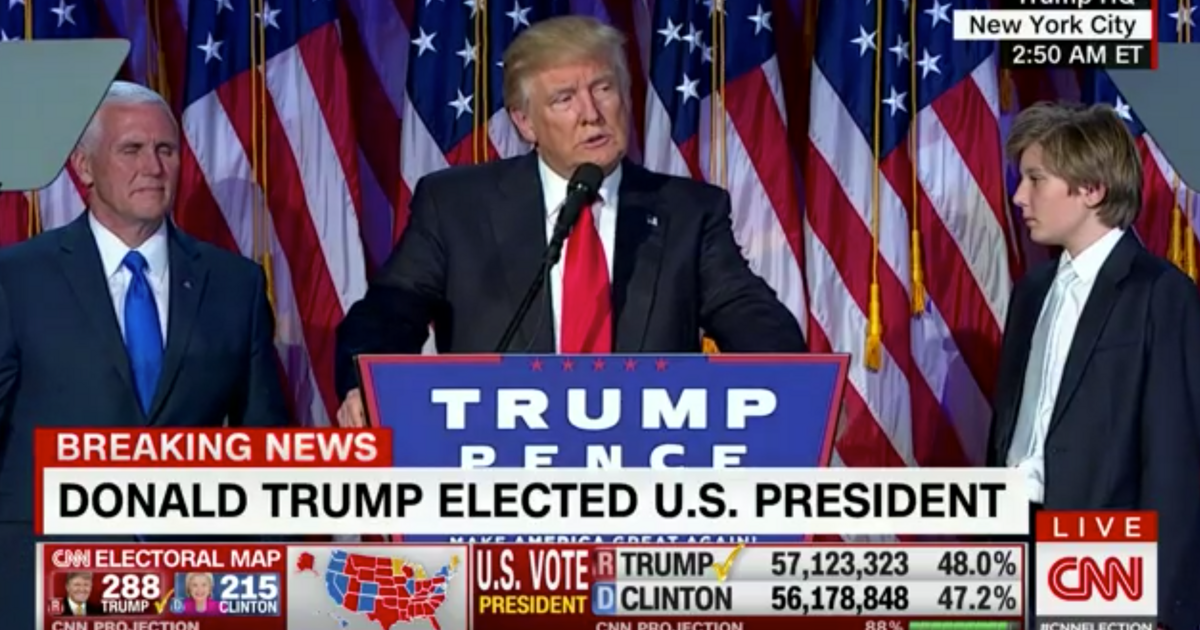US election may be legitimate but Trump’s politics are not

It probably goes without saying, but I’d prefer to be writing about almost any subject imaginable today, instead of the election of Donald Trump to the US Presidency.
Like many people, I spent Tuesday night fending off a growing sense of foreboding, and most of Wednesday in a kind of free-fall. 2016 had already been bad enough for anyone who believes in progressive values and a decent society based on compassion and respect, yet many people still instinctively felt this couldn’t happen. Voters will think again on the day, some thought. Not the die-hard conspiracy theorists and alt-right maniacs with their ‘Lock Her Up’ T-shirts and worse, but the decent, put-upon people in the middle who are just desperate for a change. They’ll come back from the brink, surely? Or the Democrats’ election machine, widely acknowledged as far more organised than the Trump campaign, that’ll make the difference and raise turnout from everyone who seems him for what he is.
But no. Despite gaining fewer votes than either Romney four years ago or McCain before him, Trump was carried to victory by the apathy, or perhaps more accurately the political dejection, of former Democrat voters. The Republican vote declined, but not by nearly as much as the blue column, with many people either unable or unwilling to get out there and positively back Hillary Clinton.
It’s not hard to see why. Someone who eight years ago was one of two clearly outstanding candidates for the democratic nomination, now carries much more baggage. In a contest clearly cast as a popular revolt against a political establishment, she was in trouble from the start.
In trouble, but by no means out of the picture. It must be a particularly harsh irony for her that, just as happened in her election against Obama in 2008, she narrowly won the popular vote against Trump but lost the nomination.
None of this should be taken as a lament for a wonderful Clinton presidency that was never to be. I suspect she would have left fundamental problems of an exploitative and dysfunctional economic system unchallenged, pursued dangerously hawkish foreign policy, and many of the challenges the US and the world face would have continued to fester.
As Bernie Sanders has argued, the rejected establishment isn’t working for most people, and the anger is justified. After the historic failure of free market economics back in 2008, the dominant centre left has failed to offer a compelling alternative, and continues to pretend that the current economic system can be merely mitigated, but never changed.
But to say that change is needed is not to justify any change. Not this change. What Trump represents is a massively retrograde step on specific issues and, more essentially, a leap into an authoritarian and extremist unknown.
On the specifics, he’ll pursue the racist agenda which has attracted the white nationalist movement and its newer expression in the ‘alt-right’ to him. He’ll do his best to rip the US out of its international obligations on issues from climate change to human rights and torture. His election will send a signal to young men that the abuse of women is acceptable from the locker room to the White House, and to young women that their nation would rather elect anyone than see a woman as president.
He criticises some traditional targets of the left too, such as TTIP and Nato, but for profoundly different reasons. A moment’s examination of his record in business will show you that he’s not at all interested in reigning in corporate abuse. Many peace campaigners oppose Nato’s first-strike nuclear policy; his complaint is more focused on US self-interest, and his bellicose rhetoric has nothing in common with an anti-nuclear critique of Nato’s stance.
But the general threat he poses is far more profound. In making baseless accusation of vote-rigging, and promising to accept the result only if he won, he showed his anti-democratic credentials. His egotistical rantings show all the potential of a demagogue. His racist and authoritarian streak is nothing new either – this is a man who decades ago made an explicit argument in favour of the political value of cultivating hate, while he was making the case for the execution of five black and Hispanic children for a crime they hadn’t committed.
Are we to treat such a figure as we would any other world leader? Are we to pretend that these facts about him can be ignored now that he’s won the election?
Democracy stands at a critical point. With a 52 per cent vote against the EU being used to propagate a further swing toward racist and hard right policies in the UK, and with countries like Austria, France and the Netherlands also facing imminent elections in which the far right is gaining ground, we can’t ignore the pattern. Indeed Putin’s supporters gathered in a Moscow bar on Tuesday night showed that they understand this – unveiling a triptych of cloying, propagandist portraits of Putin, Trump and Le Pen in identical dress and pose.
These populist, ethnic nationalist, authoritarian movements represent the natural inheritors to fascism, in every important respect. While we must accept that the US election itself may be legitimate, it is critical that we say clearly that Trump’s politics are not.
This article first appeared in the National
